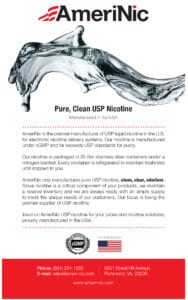Market Watch: Philippines
- Industry insights This Issue
- August 20, 2021
- 11 minutes read

Credit: Craitza

The Philippines is set to approve the most progressive and risk-proportionate vaping legislation in Asia-Pacific.
By VV Staff
There are an estimated 17 million smokers in the Philippines. An estimated 117,000 of them die every year from smoking-related diseases, according to Quit for Good, a nonprofit organization that advocates “real, practical and tangible” solutions to smoking cigarettes. However, next-generation tobacco products, like electronic nicotine-delivery systems (ENDS), which studies have shown can be up to 95 percent safer than combustible cigarettes, have had a challenging path to market in the country.
In November 2019, Philippines President Rodrigo Duterte announced a ban on the use and sale of e-cigarettes. It was a sudden and unexpected decision that was made in part due to the rising number of cases of e-cigarette or vaping use-associated lung injury (EVALI) impacting the U.S.. A 16-year-old Filipino girl was also diagnosed with EVALI after using e-cigarettes for six months, prompting the country’s Department of Health to raise concerns.
“I will ban it,” Duterte declared at the time. “The use and importation. You know why? Because it is toxic, and government has the power to issue measures to protect public health and public interest.”
In February of 2020, Duterte signed an executive order that prohibited the use, sale or purchase of cigarettes or other tobacco products by anyone under the age of 18 or ENDS or their components by a person below 21 years old. Then there were proposals to raise the purchase age to 25 for ENDS and ban all vape flavors other than menthol and tobacco.
The U.S. Centers Disease for Disease Control and Prevention (CDC) then finally admitted publicly that EVALI was caused by black market marijuana vaping products rather than nicotine products. As the news spread, the Philippines began to reconsider its position of less-risky alternatives to cigarettes like vapor and heated-tobacco products (HTPs).
Consumer advocates in the Philippines began to promote the regulation of e-cigarettes as a consumer product. They pointed out that the age one can purchase tobacco, alcohol and get married in the Philippines is 18, so the 21-years-of-age requirement to purchase vaping products was nonsensical. At the same time, they argued that adult smokers keen to quit tobacco need reasonable access to safer alternatives, and restricted advertising should be permitted. Product safety standards were also critically important to the consumer advocates.
Earlier this year, the Philippine House of Representatives proposed the Noncombustible Nicotine-Delivery Systems Regulation Act (House Bill 9007). The bill is a massive legislative achievement for tobacco harm reduction advocates in the Philippines, according to Nancy Loucas, executive coordinator of the Coalition of Asia-Pacific Tobacco Harm Reduction Advocates (CAPHRA), a regional alliance of consumer tobacco harm reduction advocacy organizations.
If the measure becomes law, it will authorize the country’s Department of Trade and Industry, in consultation with its Food and Drug Administration, to set rules, regulations and standards on packaging, ingredients and graphic health warnings on ENDS products. The bill also includes the following provisions:
- Only retailers can sell ENDS, electronic non-nicotine-delivery systems (ENNDS) or HTPs. Selling to minors is prohibited. Retailers will have to ask buyers for a valid government-issued ID.
- Manufacturers, importers and distributors must comply with certain packaging and health warning requirements.
- The use of alternative products will be prohibited in all enclosed public places except in designated vaping areas. Indoor use of the products is prohibited in schools, hospitals, government offices and facilities intended for minors.
- The sale or distribution of these products within 100 meters from any point of the perimeter of a school, playground or other facility frequented by minors is prohibited.
- Manufacturers are prohibited from sponsoring any sport, concert or cultural or art event.
In May, House Bill 9007 passed the House with 192 of its 300 representatives in favor—with only 34 voting against it and four abstaining. The Senate bill is expected to be voted on in September, although as of Aug. 2, it was still in the Philippines’ Senate trade subcommittee, which is deliberating four separate bills seeking the regulation of vaping products.
Several of the country’s health experts and advocates have asked senators to keep the current law with a purchase age of 21 or raise the age to 25 to purchase or use vape, e-cigarettes and vapor products in order “to curb its harmful effects on minors.”
In a press release, Philippine College of Physicians Executive Director Encarnita Blanco-Limpin stated that under the Republic Act No 11467 (a bill based on Duterte’s executive order), the age of purchase for vaporized nicotine products and heated-tobacco products is 21 years old and that should not change. She added that lowering the access of e-cigarettes from those 21 years old to those 18 years old is a retrospective act.

“Scientific studies have shown the age of maturation actually occurs at the age of 25 years. Now, if we are thinking of changing the minimum age of purchase, maybe what we should do is even increase it to 25 years,” she said. “To be consistent, since all of these [are] addictive substances, maybe it is wise to consider that we put the minimum age of purchase for all the vaporized products, heated-tobacco products, all the regular tobacco products and even alcohol at the age of 21, or even perhaps at the age of 25, so that we will be able to prevent our young from taking up [this] addiction at an earlier age.”
Peter Dator, president of consumer group Vapers PH and a CAPHRA member, hopes the Senate will pass the legislation, and he is confident a clear majority of senators realize just how much is at stake.
“This needs to get passed to ensure millions of Filipino smokers continue to have access to safer nicotine products. At the same time, existing vapers must maintain access to their product of choice to keep them from going back to cigarettes,” he says. “We would like to thank our congressmen for looking at scientific evidence in coming up with a bill that would provide Filipino adult smokers a choice to switch to less harmful alternatives to combustible cigarettes.”
The Philippine representative of CAPHRA, Clarisse Virgino, is also hopeful the Senate will give its approval, which is required to enact the legislation. She says the legislation will legitimize the fact that tobacco harm reduction is “a real thing backed by science,” adding that international evidence continues to put vaping at 95 percent less harmful than smoking.
“It’s vital this legislation gets Senate approval. It will give consumers better protection, enabling them to choose genuine THR products at a reasonable price. Fair regulation will also eradicate any black markets or any sellers who are not authorized to sell THR products, prioritizing the safety of consumers,” she says. “I am confident that like our House representatives, our senators have listened. Without doubt, vaping has proved to be [the] world’s most effective smoking cessation tool. Legitimizing it will go a long way to helping many more Filipino smokers quit cigarettes and protect the rights of consumers to access safer alternatives.”
Loucas says the Philippines’ goal of adopting best practice tobacco harm reduction policies will hopefully be emulated by other Asia-Pacific governments. She says that many of the region’s territories suffer from desperately high smoking rates, and in some countries, such as Thailand, vaping remains illegal.
“This move will only strengthen the Philippines’ independence as it shakes off any remaining vestiges of foreign influence on its public health policies. In recent years, we’ve seen American billionaires and their so-called philanthropic foundations fueling anti-vaping sentiment around the world. It’s well established that the Philippines has been a target,” she said. “As this landmark legislation nears its final hurdle, outside pressure will again pile on, but senators can be confident their positive action will undoubtedly save thousands of Filipino lives.”
According to 6W Research, vaping products are growing in popularity in the Philippines and are “anticipated to witness profound market growth” throughout the forecast period of 2020–2026. The group is predicting a compound annual growth rate of 26 percent.
In April of this year, YOOZ, a major Chinese e-cigarette brand, opened its first store in the Philippines. There are now 31 YOOZ stores nationwide. Willy Lim, a YOOZ franchise owner in Manila, said YOOZ stores in the Philippines have seen a surge in sales, according to a press release. “I am very happy to have made the right decision to join YOOZ,” Lim said. “With such a trustworthy partner, I am very confident in the future of this industry.”
